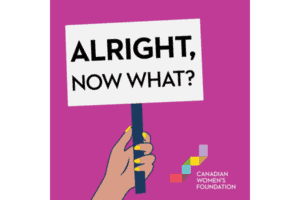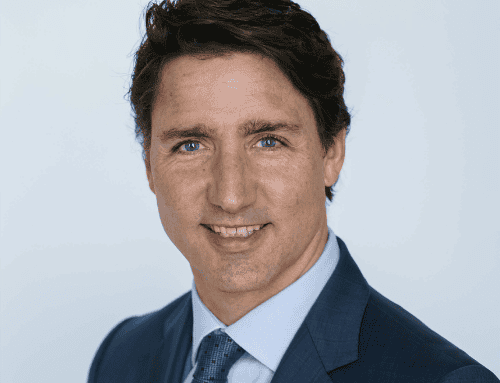 After nearly 2 years of a global pandemic with severely gendered impacts, how are women, girls, and Two Spirit, trans, and non-binary people fairing today? What do the losses in three decades of gender equality gains and alarming trends mean when we’re searching for a better way forward? What is the state of gender justice in Canada at the top of 2022?
After nearly 2 years of a global pandemic with severely gendered impacts, how are women, girls, and Two Spirit, trans, and non-binary people fairing today? What do the losses in three decades of gender equality gains and alarming trends mean when we’re searching for a better way forward? What is the state of gender justice in Canada at the top of 2022?
Paulette Senior, President and CEO of the Canadian Women’s Foundation, recently wrote about this topic in The Hill Times, saying, “We need gender justice pursued at a level, pace, and sophistication Canada has not yet known.” In this episode, Paulette gives us deeper insight into what’s so concerning about the state of gender justice today and where we need to go.
Paulette Senior has devoted her life and career to breaking down systemic barriers and building up diverse women and girls. Her personal experience immigrating to Canada from Jamaica as a young girl ignited her interest in social justice and helped make her the dynamic, grounded leader she is today. She is a sought-after thought-leader on numerous issues including gender equity and gender-based violence, women’s poverty and the gender pay gap, girls’ empowerment, and leadership. Her focus at the Canadian Women’s Foundation is to bolster an inclusive national movement for all women, girls, and communities across Canada.
Transcript
00:00:00 Andrea
Hi, I’m Andrea at the Canadian Women’s Foundation. We need to address one of the most pressing questions at the top of 2022.
After nearly two years of a global pandemic with gendered impacts, how are women, girls, and Two Spirit, trans, and non-binary people fairing today?
What do the trends mean for the way forward? What is the state of gender justice in Canada?
Welcome to Alright, Now What?, a podcast of the Canadian Women’s Foundation. We put an intersectional feminist lens on stories that make you wonder “Why is this still happening?” We explore systemic roots and strategies for change that will move us closer to the goal of gender justice.
The work of the Canadian Women’s Foundation and our partners takes place on traditional First Nations, Métis, and Inuit territories. We are grateful for the opportunity to meet and work on this land. However, we recognize that land acknowledgements are not enough. We need to pursue truth, reconciliation, decolonization, and allyship in an ongoing effort to make right with all our relations.
00:01:06 Andrea
Paulette Senior, President and CEO of the Canadian Women’s Foundation, recently wrote about the state of gender justice in The Hill Times.
Today she’s giving us some deeper insight about what’s so concerning and where we have to go.
00:01:20 Paulette
I find it quite staggering for a couple of reasons.
One is that we’ve worked long and hard over the decades to actually be able to advance for 30 years on matters of gender equality.
So, to have it be at risk, and for it to be multiple decades at risk, I find that to be quite staggering.
There are three specific areas that really gives us a sense of this scope of what it is that we’re actually facing today.
So when you look at economic opportunity, certainly there’s been significant risks there. In our, in safety, we’re looking at safety, not just about the pandemic because that’s what we’re living through at the moment, but safety in terms of gender-based violence, as well as you know discrimination and discriminatory practices. These are three key areas that we know we have certainly suffered some risk throughout this pandemic, but they’re not new, it’s just particularly significant in the midst of a pandemic.
00:02:19 Andrea
And I think you’re speaking very much to the areas that the Canadian Women’s Foundation works on, this idea of out of poverty, out of violence, into confidence, in leadership.
And it’s pretty heartbreaking to see that those are the very areas that we’re seeing take a hit.
00:02:36 Paulette
This became our work 30 years ago because we saw these as the critical areas impacting women’s lives and so when you look at the economic part of it, for example, almost half a million woman in Canada lost their jobs by January of 2021. So we know the pandemic started in officially in Canada in March of 2020. So less than a year later, over half a million women in Canada lost their jobs and the jobs that they were in were primarily in sectors that are most affected by the pandemic.
So when you look at the unemployment rates, for example, they were worse for racialized women as well as women with disabilities. And the job losses that they suffered impacting women who have small children. So when you think of, for example, women with childcare needs having to choose between giving up their jobs and staying home with their children, that’s not the kind of society that we want to be living in, where there’s no opportunity for women to have easy, affordable access to childcare.
And then when you look at safety, for example, so risk of gender-based violence such as intimate partner abuse and sexual assault has also increased. We’ve seen that in terms of the studies that have been done that there’s been a spike, particularly in the area of femicide. We also have seen that indigenous women more often reported experiencing the highest rates of discrimination and unfair treatment, as well as folks within the 2SLGBTQI+ community.
So, we’re seeing that the economic piece, the safety piece, the discriminatory pieces all come together to really demonstrate the the risk to the progress that we’ve made.
Together, all of this is really focusing on a number of gender injustices that didn’t just happen during the pandemic. It didn’t come about because of COVID-19 in Canada, but they’ve been around for a while. We’ve been talking about this for a while and what it’s meant is that women, girls, and gender diverse people have faced very high disproportionate onslaught of the pandemic worst impacts. So because they’re already vulnerable, it’s made them even more vulnerable because of all the issues that they were facing prior to the pandemic.
And so, 30 years of hard fought for progress is not just at risk, it’s the experience of countless women in Canada.
00:05:03 Andrea
Early 2022, we’re thinking about what now, in light of the losses, what would pursuing gender justice look like in Canada? What would it mean?
00:05:12 Paulette
I love this question because it speaks to action because gender justice is something that we must all pursue, and pursuit means that we need to take action.
We need gender justice that’s pursued at a level, pace, and level of sophistication, understanding that Canada has not yet known. That’s really what we need. We need to be operating at a level, implementing initiatives, understanding the critical areas that are impacting women’s lives, and working at it at a level that we don’t know. Something that we haven’t yet done. And given where we are and how much we’ve lost a great deal of rebuilding, has to happen this year. It has to happen in 2022.
And in fact, the rebuilding of gender equity efforts must be the focus of our political priorities. And so this has been the constant message and consistent message that we’ve been bringing forward to political leaders federally, but also at all political levels of provinces as well, the territories and the municipalities need to understand that gender equity efforts must be their focus, particularly as we look at the recovery and beyond the recovery.
We’ve seen some truly promising announcements that have been made, such as national childcare or pay equity that we’ve been struggling for for so many years. Housing, which is such an ongoing but persistent and growing problem in Canada. The issue of homelessness and how those who are most vulnerable are unhoused as a result of not just a pandemic, but the systems that are not in place, the emergency investments they’ve seen made to help ensure survivors of abuse can access gender based violence services during the pandemic are important, but what we really need, what we really need this year and going forward for gender justice is to be positioned as a central tenant in government.
It can’t just be something that is a remedial response, it has to be central to all policy areas that’s implemented now and going forward post COVID-19. It needs to be cemented so that it can’t be withdrawn and seen as part of running a strong economy. A socially responsible community as well as making sure that we can actually grow, all grow together and that no one is actually left out in terms of what we know needs to be a strong economy.
00:07:49 Andrea
I think a lot of people are really feeling the whiplash in a sense because they can’t believe that 30 years of good progress, hard won progress as you’ve mentioned, is now so at risk and in many senses feeling like a reversal.
It does make me think about what’s the root causes that we’re looking at.
What are these contemporary issues?
Where do they route back to and what needs to change?
Give us a sense of that in your opinion and in your work that you’ve seen.
00:08:15 Paulette
Well, quite frankly, I think it’s impossible to address a problem without understanding the root causes.
You know whether you’re talking about racism or issues around gender, disability, we have to understand what the root causes are.
Many of the common gender inequity issues that we face is rooted in the way that we’ve treated women, that women have are looked at in this society, and so we have to be able to frame gendered inequities as not just private matters.
Because they’re not.
That’s how we framed them historically.
We’ve told women who have been abused that it’s a private issue.
We’ve closed our doors and our ears to the issues that women may bring up.
Whether to us as friends or as neighbors or even in terms of our work environments, and we have also left mothers to take care of unpaid childcare and marginalized women, racialized women to take care of underpaid care work.
So, in that sense, what we’ve been doing is banking the economy on their backs.
And the time to end that is now.
We have built a nation on colonial abuses and really have placed indigenous women, girls, trans, Two Spirit and non-binary folks at, I would say, astronomical levels of risk of violence.
We’ve also seen that black women with disabilities and migrant women have faced the highest rates of discriminate discriminatory practices across so many sectors, whether you’re talking about their health or education or housing, or in their ability to lead and lead effectively. These discriminatory practices have really impacted their lives no matter what sector touches their lives.
And so the research and poll findings that have come out year after year have proven this beyond a doubt. And yet the investments in terms of the right solutions do not match the scope of the barriers that women are facing. We really do need to have to be able to overcome this long history that’s been rooted in broad gender dynamics that we have historically taken for granted.
What I would say, Andrea, as well is that we need to keep asking the really hard, tough question we need to be able to not let ourselves off the hook, and when I say ourselves, I mean society, governments, all the errors that touch our lives, we can’t let ourselves off the hook and just say that’s the way things are.
Why should women and gender diverse people live at such great risk of abuse?
Most often by men they know, and most of whom they love.
Why our long called for national childcare plans and national action plans to address gender-based violence moving forward only now?
And why are most of the calls to action and justice on missing and murdered indigenous women and girls and truth and reconciliation left unfulfilled? And we’re finally taking action.
Why is that all just happening now and and why should women’s work be so underpaid? And under protected? When all of our lives actually depend on it, all of our lives depend on what we call, quote, unquote, woman’s work.
So where are the plans and policies and tax expenditures that will make a real difference for most of the marginalized women and girls and gender diverse people, we’re not seeing that as priorities. We haven’t seen that as priorities and I’m hoping to actually see that this can happen in 2022 and beyond. As we wrapped up 2021, we haven’t really at this point in time, we’re not getting the rights and respect that we deserve.
I’m really working towards, through the work of the Canadian Women’s Foundation in collaboration with other women organisations and justice equity, gender justice organisations, working towards bringing this to an end. This practice of what I would call disrespect.
And working towards a society where we can address the challenges that we’re facing head on, that we can get to the work of rebuilding the lost gains, that we can push past the pre-pandemic point and actually be able to know that all of this work will impact all of us across all party lines. So, no matter what political stripes we are, no matter who the political leader is, no matter what level of government we’re at, no matter the work that we’re doing, that we need to be able to push past for the pre-pandemic points because we know that these issues existed prior to the pandemic. And so this is an opportunity to rebuild in a way that makes up for the losses but also strengthen society and structures things in a very different way and so that we can finally root out some of those issues that have been the root causes and create a society where no one is actually left out. Or left behind.
00:13:33 Andrea
Alright, now what?
I think it’s clear that we have to push for gender equity and justice as central to decision making.
It’s not a niche concern.
Every policy and every level of government needs to respond and we need to vote and hold our leaders accountable accordingly.
We also need to pursue gender justice in our own lives too.
Think about your sphere of influence, work, community, neighborhood, friends and family.
How can you commit time, attention and resources to help pursue gender justice at a level, pace and sophistication we have not yet seen?
It’s something for all of us to consider, learn more about and give it a go.
Yes, it feels big, but all systemic change feels big.
The issue is to try to look at it in small chunks that make sense for you in your day-to-day life and join in with communities who are trying to do the same thing.
Please listen, subscribe, rate and review this podcast and share it with others.
If you appreciate this content, if you want to get in on the efforts to build a gender equal Canada, please donate today at canadianwomen.org and consider becoming a monthly donor. And thank you for being tireless in your support for gender justice






